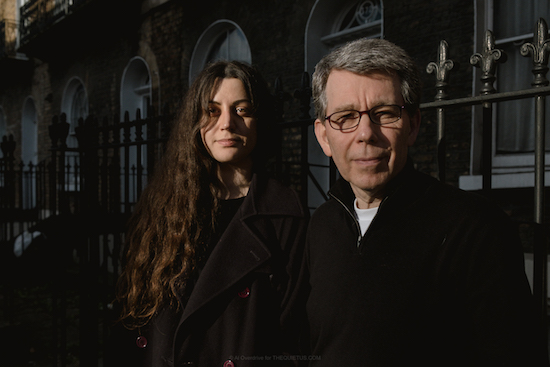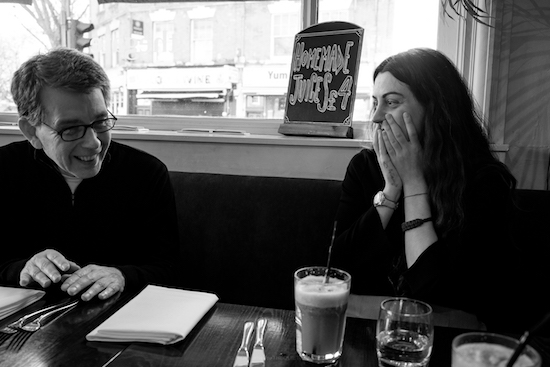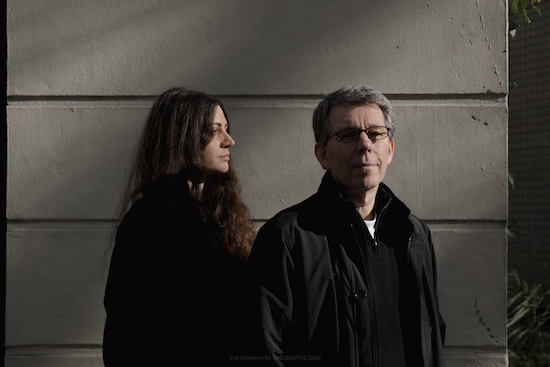All photographs by Al Overdrive
On what actually feels like the first day of Spring, I’m sat in a restaurant with one of the most exciting producers of recent years, alongside one of the most resonant names in industrial music. They’re not a pair that you’d necessarily associate with each other, but as I found out, they have some shared musical philosophies. The two place emphasis on experimentation and improvisation, and on embracing whatever “mistakes” might come out of the process. Had I not known what I know, I could’ve mistaken the two for old friends or even collaborators, such was the feeling of shared ideals about the creative process. What further unravels is a myriad of musical connections through Daniel Miller, Factory Floor, obscure synthesisers, and even Throbbing Gristle playing in Brescia, northern Italy, where Marta grew up.
Both artists seem to be at particularly exciting points right now. Chris Carter is releasing his first solo record in 17 years, through Mute. It’s a record within which you can hear the legacy of his career in industrial and electronic music, but yet it still sounds contemporary. Marta meanwhile has been busy recently, mixing, producing and engineering for the likes of Bjork, Liars, Sampha, These New Puritans, Moonlandingz and M.I.A.
We spent an indulgent and cruelty-free couple of hours at The Gate in Islington, just a stone’s throw from TQHQ.
So have you two met before?
Chris Carter: No, we’ve not..
But you’ve seen Chris play before right Marta?
Marta Salogni: I did. I saw you at Rough Trade a few months ago, it was really good, and I see that you’re playing at The Social soon?
CC: Yeah next week, in central London, just with a little suitcase of modules.
MS: Like the ones you played at Rough Trade?
CC: Yeah but different. With that one I was using the TG One modules. This one hasn’t got those, it’s more experimental, I just make it up as I go along.
MS: Did you improvise at Rough Trade?
CC: I did yeah! It didn’t go to plan.
MS: Really? It seemed very seamless, I loved it. I loved the journey of it.
CC: Yeah it was a journey, it just didn’t go in quite the direction I thought it was gonna go. But you have to go with it.
MS: But you had a plan in mind?
CC: Well originally I was going to showcase the modules, and give a demonstration of them. They’re these sample playback modules. They’re a special edition and they’re only small, and they come with these little sample cards with 256 Throbbing Gristle samples on them. So we’d just released this and I was gonna do a showcase, just a little case with some modules, and I turned it into more of a gig. Then afterwards we did a Q&A with Daniel Miller. Everyone seemed to really like it.
MS: Yeah I was totally transported.

CC: Are you into Eurorack?
MS: At the studio we’ve got the Roland System 100.
CC: Ah right I used to have that, it’s quite deep isn’t it?
MS: Yeah, Daniel [Miller] comes in and builds a patch and leaves it on, and I don’t repatch it, I just try it, and follow the signal flow and experiment with it a bit. Sometimes I get really nasty things, which can be brilliant. And I just record whenever I get something good.
CC: So stuff all always connected so you can just hit record?
MS: Yeah I’m always recording things.
CC: Sometimes it’s great capturing those happy accidents, when you plug it in the wrong way and it sounds even better…
MS: Exactly, and some things I can’t explain, and I don’t really want to know either.
CC: How long have you been in that studio?
MS: I think a year and a half now..
HM: So this is Daniel Miller’s studio right?
MS: This is Mute, yeah. I’m based there now so I’m there every day. There’s so much stuff that sometimes it’s almost overwhelming.
CC: It’s weird that you say that because even now, I’ve been doing it so long now, but I get overwhelmed sometimes by technology. In our studio we’ve got a wall with a load of modules, and I look at it some days and I just think, ‘No, not today.’
MS: I just feel like I’m shy with it sometimes.
CC: Are you working on your own?
MS: Yeah, I’m working on my own – sometimes on Mute stuff. Everyone goes home around 6.30pm, so I’m there until midnight, sometimes I sleep there. And at the weekends it’s great because there’s no one about, so I just feel like I can do anything. I’ve recently been playing around with a Buchla system actually, you can lose hours with it.
CC: And that’s a totally different mindset, using Buchla. There is such a difference between the West Coast and East Coast approaches to synthesis, and they very rarely cross over.
I think it’s only now that some of this is crossing over, with Eurorack.
CC: Yeah with Eurorack it’s like a combination of the two mindsets. It’s kind of in the middle. You could build a clone of a Buchla system in Eurorack, or build a clone of a Moog system…
MS: And just patch everything into each other… It’s all quite recent right, the Eurorack stuff?
CC: I guess so yeah, cause I had a 100M, I had like 5 racks of it. And then in 1999 I just sold it. It was malfunctioning, and it was getting expensive to fix, so I was sending it to Cambridge to be fixed, and I reached this point where I realised I was spending more time with it out of the studio being repaired then I had it in the studio. But after I sold it I instantly regretted it, cause I’d had it since the 70s, and I thought “that’s the biggest mistake I ever made.” So I had to rebuild something similar, but I couldn’t afford to buy it back, because it went up in value, so I did it in Eurorack.
MS: So now do you think you’re better of with a more flexible system like Eurorack? The Roland is amazing, but it’s only Roland.
CC: Well, I find I’m more productive if I’ve got a smaller system. I bought a Roland System 500. It’s very similar to the 100M. And I get loads of work done if I just stick to that one system. So now I build these smaller systems in small cases, where I just have the modules that I think I can work with the most, and I’m more productive like that. I still have the big system at home, but sometimes it’s too big and I spend hours on things and it doesn’t really work for me. But if I just stick to a smaller system I’m more focused.
MS: Yeah, having limits…
CC: Yeah it gives you some discipline.

Marta is that a problem you’ve had in the studio with all these synths? Do you need to set limits for yourself?
MS: Yeah, well I do end up being drawn to particular things. So I always go to the Minimoog, cause it’s intuitive and I know the interface so well. I switch it on and it works. Sometimes I go to the Polivoks, and it’s in Russian, and I’m embarrassed to say it but it’s been a week, and I switch it on and it doesn’t make a sound. I want to figure it out by myself.
CC: So all the labels are in Russian?
MS: Yeah, and it’s just silent! But I like these things sometimes because they’re temperamental and that’s quite human. Sometimes I switch on the Moog and it’s really hard to get it in tune. I think it might be because of the temperature? It’s such a human character. I love that link, when machines behave like we do, rather than be completely predictable.
CC: Yeah, especially with analog stuff, cause it’s made of so many components, and all those components are slightly different on each version of that machine, so they do develop this sort of personality. One Moog will have a slightly different personality to another. Maybe one Moog changes in the heat, and another one isn’t too bothered.
MS: Yeah exactly. It’s pretty mindblowing really!
Has that unpredictability ever cause any problems for you?
CC: Well when you’re using that sort of equipment, you might write a good patch one day, then the next day it sounds quite different.
MS: Yeah I’ve had that with a mixing desk, where there’s a mix on the board and you come back the next day and it just doesn’t sound the same.
CC: And with that sort of stuff you never know if it’s really different or if it just sounds different to you. I think it’s because emotion can affect how you hear things, and if you’re tired at the end of the day it sounds a certain way.
MS: Yeah it just adds another level of unpredictability.
CC: So is that a problem when you’re working with clients? They come back the next day and it’s a problem that something’s changed?
MS: Yes, many times. There will also be times where I’ve made a very minimal change, but then in their minds, because their request has been met, everything is fine. So sometimes there’s some psychology involved. I have to be as good as I can technically, but also make sure I understand the whole emotional involvement of making or mixing a record, and to never underestimate that, because it’s a huge part of the process. And of course, I can never disregard someone’s opinion. Sometimes an artist will ask for such a small change that doesn’t really change the track, but for the artist it makes a big difference. Sometimes you also have to unlearn technical aspects too, for a better end result that matches the artist’s intent. Also, the correct thing to do isn’t always the best thing. Removing some background noise coming from a guitar amp isn’t always the best thing to do. Sometimes emotional intelligence needs to come before technical purity. If I’m stuck with a mix I’ll often just do something really extreme, I’ll turn the compressor all the way up or something, and suddenly you can realise what you were missing.
CC: It points you in another direction.
MS: Yeah, making mistakes on purpose. The instinct can be that that it’s ‘wrong’. This happened to me mixing a track recently. I used to clean up vocals very surgically, and get rid of any vocal clicks because they can be distracting. With this particular song, it was Bjork actually, a track called ‘Blissing Me’, and the lyrics were, “All of my mouth was kissing him.” The vocal had a lot of clicks and I just left everything in. The performance is full of these saliva noises and to me it makes sense in the context of what was being expressed, so I left everything in there. I think that experience gave my mixing a more imaginative approach.

What was it like working with Bjork.
MS: She was brilliant. I went to Iceland for it. From the start it was quite a surprise. I came back [home] late one night, and I’d received this message saying, “I’ve been trying to get hold of you, please give me a call.” It was from someone called Derek. I didn’t know who Derek was. So I spoke to Derek and he asked me to do two trial mixes, and I asked what band it was for and he said Bjork. I thought it was a prank, but I asked my manager and they said it really was for Bjork. So I dropped everything.
CC: Was it a long project?
MS: Yeah, well I came into the project [Utopia] fairly late on. I went to Iceland in August and came back in September. I was there three weeks. Bjork would come to the studio every day and we’d work on the tracks. It was brilliant because it felt very collaborative. She would often tell me what a track meant to her, and I would try and convey that message in the mix. It was a huge challenge, but I’m really grateful to have learned so much with her.
CC: So do you do your own music too?
MS: I do but I keep it strictly live, so I improvise and, sort of slightly compose. Perhaps [if I end up with] a body of work that I’m happy with from these live shows I might release it. When I’m in the studio and I’m playing around with synths and tapes I do record a lot, but I do it to sit back and listen to it and consider it, and then ultimately I play it live.
CC: So in the studio you’re working out ideas?
MS: Yeah…
CC: How often do you play live?
MS: Every couple of months, fairly regularly. Usually I’ll have a few tape machines, and at the last one I had a big white board and I put some nails in it, and I made a loop going around the nails, and I’ll be playing and reciting poems. I was reading Mayakovsky, a Russian poet who I really love.
CC: Are you treating your voice in any way?
MS: Yeah, I’m putting it through the tape, so it has that quality and it’s in with the delays. I’ll emphasise certain words with more delay and things. I did a poem where there are different voices, and I slowed the tape down to a different pitch for different voices. And I’ll grab the tape and suddenly it’s silent, and then you let it go and it catches up and becomes a bit chaotic. At the end I’ll unplug everything and take out the nails.
CC: So putting the nails in is part of the performance?
MS: Yeah absolutely. It’s nice because it exists only then.

Both of you improvise quite a bit in you performances, which must go wrong occasionally?
MS: Yeah, cause sometimes I jump on with bands to improvise, and it’s usually quite last minute, and one time I put the tape in the wrong way round and it wasn’t doing anything. One gig, I forgot to plug in my mixer. Those things, it’s not an acoustic instrument, so it’s harder to tell why something’s not working. When it goes wrong, it can go horribly wrong.
CC: Sometimes the audience goes with it though don’t they?
MS: I think it’s important to maintain a level of humanity in a performance, where the audience doesn’t see you as perfect, but that you’re just a person. People fall over on the street all the time, and sometimes that happens onstage too.
I think it’s good to have a sense of humour about this stuff.
CC: You have to, you really have to. With TG [Throbbing Gristle], something went wrong at every gig we ever did, because all the gear was held together with gaffer tape.
Was that part of the appeal of TG do you think?
CC: It was, yeah. It sounds weird to say it about TG, but you have to be professional about it. You have to carry on. I’ve seen bands that just walk off stage if something goes terribly wrong. I suppose we were lucky back then because we had a singer that engaged with the audience. It could be chaos behind him while we’re trying to get something working again, but the audience giving us a chance to bring it all back.
MS: And when it happens it’s so beautiful!
CC: Yeah, one of the biggest gigs we did was at the Astoria on Charing Cross Road, before they pulled it down, and it was all being recorded and there were loads of cameras, and within five minutes Gen’s bass just stopped working, so we had to stop the whole gig a reset everything. People were laughing though, it wasn’t stressful.
And it makes that moment when everything works so much better than if it had all worked form the start.
CC: Yeah everyone was cheering when it started working again, and it brings everyone back in. I quite like all that. It’s unpredictable.
I think you can build a better relationship with the audience like that too.
CC: You can yeah. It’s funny cause I used to use a laptop onstage quite a bit. I never had too many problems, but sometimes the bass would make the hard drive jump, and bits would just keep repeating. Since I stopped using a laptop I’ve had a lot less problems and a lot less stress. I’ve really gone off the thing of looking down at a laptop onstage now actually. I saw a Mute band a few years ago, I think it was Komputer, and they were doing a live show with laptops, and their emails kept going through the PA. They’d not quit their email program. But it was really funny. People were laughing every time it happened.
Marta, I wanted to ask about the assumption that so many people make that there’s a man doing the technical work behind every successful woman in music. As someone who pretty much exclusively does technical work in the music Industry, I wondered what your experience of sexisim in the industry has been, and if you feel you have to work harder because of your gender to get equal recognition?
MS: Yeah, I’ve had it since I started working in Italy, in live sound especially. Just the phrase “sound guy” is still so prevalent. For me, I worked in a lot of feminist venues in Italy, so I was quite lucky. But still, some bands would turn up and ask, “Where is the sound engineer?” I’d just say, “She’s standing in front of you.” People will question you, or offer you help when there’s no need. Often they’re not qualified, and I’ll know what I’m doing, but they’ll still insist. It’s an entitlement thing. I stopped doing live sound when I came here [London], and in studios there is always this thing of having to prove yourself more than anyone else. It was never automatic recognition for my work, it’s always harder. People would always assume I was at a lower level than I was. This is both with clients as well as colleagues. It’s not something that goes away, it’s just so ingrained, and people don’t even realise they’re being sexist, or they think it’s a joke. I do a lot of mentorship for other women, so I speak with a lot of women and, without doubt, all of them have experienced this.
CC: Is it any better than it was?
MS: It is, because now the issue has been brought to the light of day a bit. It’s less accepted, and it’s been shown to be a problem by a lot of labels, artists and producers. More women are getting employed and rewarded for their talent instead of being ignored. Especially with the new generation, people who are around 20 now, they are so conscious of the issue. They’re always aware that they’re not acting out of entitlement or machismo. I think there is a revolution going on and it feels very exciting. When I started in Italy, I was the only female sound engineer that I knew of!
CC: Really?
MS: Yeah I didn’t know of any others. It was quite a lonely place and it felt hard to justify my profession.
Chris, I wondered if people ever make gendered assumptions about who’s done what on your music with Cosey?
CC: Yeah, well not the guitar, cause she’s known as a guitarist, but she’s a far better keyboard player than I am, but people assume I do all the keyboards. She learnt how to play piano and I never did. I’m slightly musically dyslexic. I have to have the letters written on the keys, cause I always forget where C is! I’m hopeless, but Cosey’s good. Marta, what you said about sound guys, that’s so true, it’s awful. We had a sound engineer once, at this gig in New York, and he went up to this woman and said, “Can you tell me where the sound guy is?” She was the sound engineer, and you could’ve heard a pin drop. She was so insulted. He was quite affronted!
Sometimes people need that I think, to have that terrible experience that makes them question why they make certain assumptions.
CC: They do yeah. That was such a classic example. Afterwards he was offering to help her plug things in and it just made it all worse! She was really capable. It was her venue and she knew what she was doing.
MS: I’ve been there so many times! I can feel it.
So your new record is your first solo record in 17 years. What made now the time?
CC: When I started it, we had Throbbing Gristle going, we were doing Chris & Cosey, which had just kicked off again. Then we were doing Carter, Tutti, Void, and I just got so busy, I needed something else to do, to relax. So I built a little desk in the corner of the studio and just started putting circuits together. I went back to what I used to do really, making my own modules and gadgets. I started to record stuff from that, but then Sleazy died, so I stopped for a year, not doing anything. After that I slowly started getting back into it, and just accumulated all these tracks.
So it’s 17 years in the making?
CC: Yeah, sort of. I stopped for a long time, but really it’s more like seven years that it took me to make the album.
MS: It’s amazing that it was made over such a long time because it sounds so cohesive…
CC: It’s weird that, I know. Some of the tracks were recorded six years apart. It’s almost like a concept album though.
What about the vocals on the record?
CC: So some were added afterwards and some were processed through the modular as I was recording them. I do a lot of field recordings, and always have, and a lot of them are vocals. Some are from other people. Sleazy gave me some vocals, not his, just things he’d collected. When TG split we were gonna do X-TG, in fact we played in Brescia [the region in northern Italy where Marta grew up].
MS: Really?
CC: Yeah we only did two [X-TG] shows and one was in Brescia. That’s weird…
Chemistry Lessons, Vol. 1 is out via Mute on March 30. Chris and Marta had lunch at vegetarian restaurant The Gate, St John Street, London



